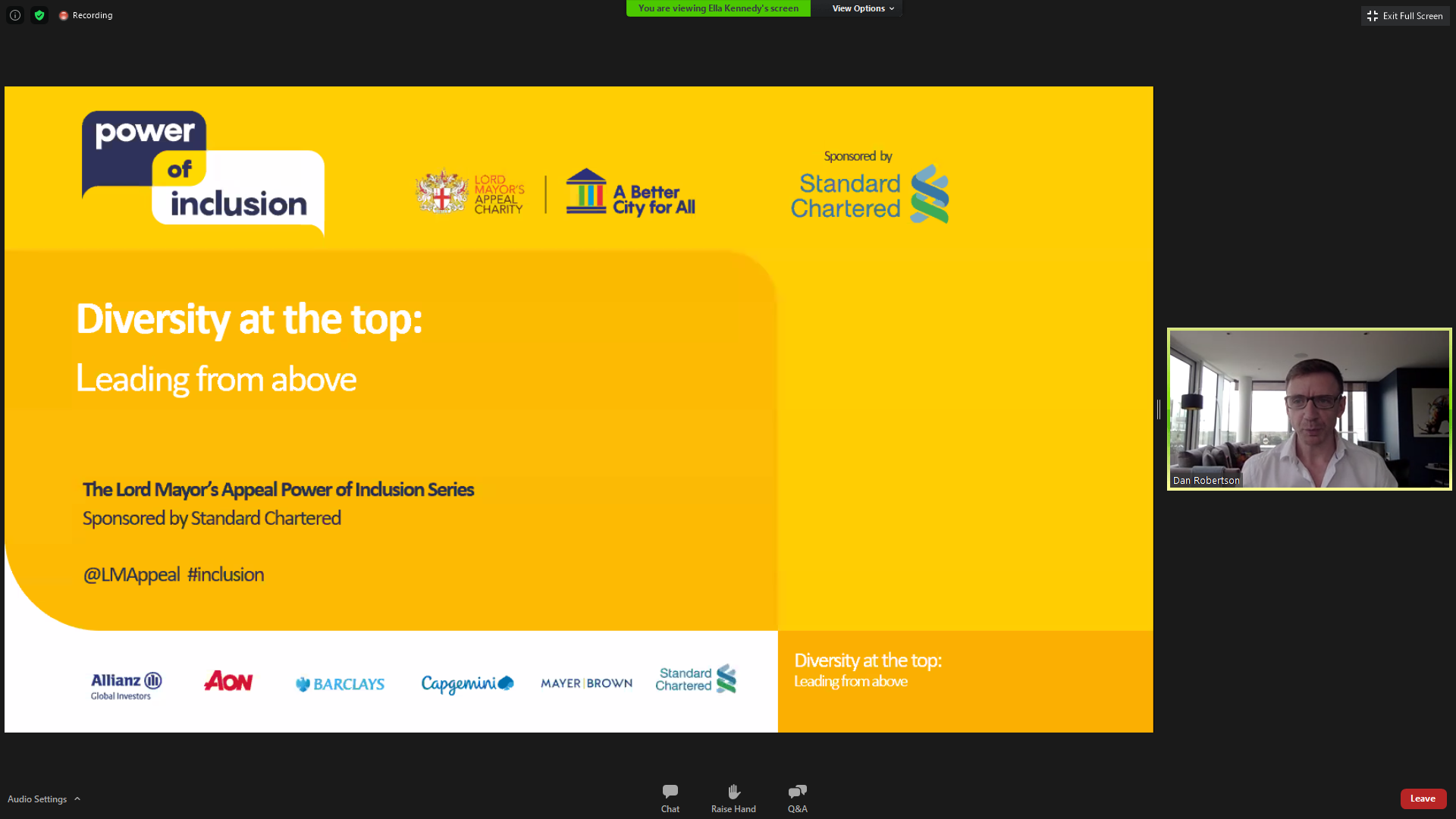
The Power of Inclusion seminar
The fourth Power of Inclusion seminar in our 2020 series was sponsored by Standard Chartered, titled Diversity at the top: leading from above.
It focused on the importance of inclusive workplace cultures and explore how to create a culture of belonging where those from diverse socio-economic backgrounds are able to be themselves and succeed in their careers and the benefits this will bring to businesses. The sessions so far have seen many organisations take tips, ideas and insights back to their businesses.
The Rt Hon The Lord Mayor of the City of London, Alderman William Russell reiterated his commitment to ensuring London is a fair and inclusive city. He acknowledged how those who are less well off have been impacted more severely by Covid-19, due to loss of income and opportunity, and the recent A level controversy also highlighted some of the unfair structures in society.
Our chair Dan Robertson of VERCIDA Consulting explained how it’s about getting on in business, as well as getting in. 39% of business leaders in the UK were privately educated, compared to 7% of the national population. Working class people are more likely to feel marginalised and out of place in the work place, with career progression not always resting on merit alone. Even with education and experience they still face the challenge of being recognised to reach leadership positions, feeling unable to reach those positions.
Steven Cooper, CEO at C.Hoare & Co, and interim co-chair of the Social Mobility Commission, told us about his story. Growing up in a working class background, he says that one of the biggest challenges was a lack of inspirational and educational role models out there to show what was possible. Initially joining Barclays, he quickly accelerated in his career, due to support from his colleagues and leadership. But due to a different background, he often felt out of place. Rather than formal programmes or structural support, it was often people offering support that really helped by metaphorically ‘putting their arms around’ him and seeing potential. Issues are multifaceted and rarely about just education or career progression, and we see a number of factors impacting social mobility, even down to things like not being able to afford the bus fare. He says that social mobility is about everyone having an opportunity to fulfil potential, but it is often that a lack of awareness is limiting us.
Tanuj Kapilashrami is Group Head of HR at Standard Chartered and proud of having diversity within the business. Having a diverse workforce also helps them work well with communities and customers, reflecting their commitment to representation across all levels of the business. Perceptively, she spoke about the importance of inclusion, not just diversity. There’s no point just having the data – inclusion has to be genuine. It’s good for business. They found that in departments and areas where inclusive cultures are most prominent, innovation is greatest so there is a really key She discussed six key points: start at the top; align to clients and needs; have inclusive leadership; focus on core people practices; demonstrate clear governance and accountability; and have transparent measurement systems.
Our round table discussion featured Annette Byron, Partner at Freshfields Bruckhaus Deringer LLP, David Clarke, Director of Services RNIB and previously worked in banks, Gavin Lewis, Managing Director at BlackRock and Christopher Woolard, Chief Executive at the Financial Conduct Authority. The introductions demonstrated how intersectionality has a big impact, with class, race, disability and more all serving to compound feelings of a lack of belonging. Behaviours embedded in organisations can make it difficult to talent to progress. We hear a lot about workplace cultures, but actually seeking to have a culture and employing people with that cultural fit can make the environment something of a limited workforce and echo chamber, and the group discussed why it is important to have an inclusive culture. Data and anecdotes show that diverse employees are an asset to the business and they need to think about why they want a diverse workforce, and the benefits this brings. It’s important that people have a sense of belonging and feel psychological safety. Leadership is about people, and a key skill is emotional intelligence.
To round up each of the panel shared one key takeaway: climb the ladder to bring more people up with you; have mentors that can help support progression; understand why diversity and inclusion is important to your business and articulate it; and formalise sponsorships that often exist in an informal way.
Initiated by Dame Fiona Woolf during her mayoral year, this is the seventh year that The Lord Mayor’s Appeal is running the Power of Inclusion seminar series (renamed in 2019 from Power of Diversity), helping the City capture the benefits of Diversity and Inclusion (D&I). This year our series will focus on social mobility and explore some of the structural barriers and internal beliefs that can stop people progressing in their careers. As we face the social and economic impact of Covid-19 we believe social mobility is more important than ever. There are six sponsored seminars in total taking place between May and November, each sponsored by a different corporate company.
The next Power of Inclusion session is on Tuesday 13 October and focuses on Networks and Sponsorship and Building Supportive Communities. A key part of professional growth is mentorship, networking and sponsorship and this webinar will look at how we can ensure that everyone has access to the same networks and sponsors and what businesses can do to improve networking opportunities to increase social mobility.